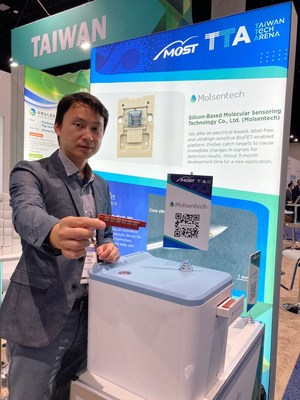With its impressive achievements, Molsentech has been selected by the TTA Global Challenge sponsored by Taiwan’s Ministry of Science and Technology to participate in US BIO 2022, poised to leverage its introduction to the US market as a stepping stone to leap further into the global stage.
TAIPEI, July 28, 2022 /PRNewswire/ -- With its impressive achievements, Molsentech (Molecular Sensoring Technology Co., Ltd.) has been selected by the TTA Global Challenge sponsored by Taiwan's Ministry of Science and Technology to participate in US BIO 2022, poised to leverage its introduction to the US market as a stepping stone to leap further into the global stage. The company has successfully launched an electrical based detection system employing ultra-high sensitivity biomedical detection technology that can be applied in various disease detection from an early stage including SARS-CoV-2.
Founded in Taiwan, the world's leading semiconductor hub, Molsentech's pivotal breakthrough was its development of a 100% semiconductor-based biosensor platform which offers valuable application in the field of healthcare for disease detection. The core technology is called Bio-FET which allows biosensors to analyse liquid-form samples by measuring the electrical signal changes caused by the interactions between detection targets and bio probes modified on the surface of biosensors. Patented in the United States, Taiwan, and China, the technology overcomes one of the biggest challenges in the industry when dealing with samples in liquid forms, interpreting the samples in 5 minutes to give immediate results.
Molsentech's bio-FET technology remains new to the biotech industry; hence, at the beginning, it mainly played a supporting role for the mainstream detection techniques, validating the detection results provided by such tests as PCR and ELISA thanks to its ultrahigh sensitivity. During COVID-19 pandemic, the Molsentech SARS-CoV-2 test chip was granted emergency use authorization (EUA) by the Food and Drug Administration to use in the manufacturing of the novel SARS-CoV-2 test kits that resulted in faster testing process and higher accuracy. This demonstrates the capability of bio-FET technology to work independently as a bio technique for molecular diagnosis. Consequently, more cooperation is under negotiation between Molsentech and other leading biotechnology companies, including but not limited to Taiwan-based ones
As its technology is now available for commercial use on a global scale, Molsentech intends to further expand its presence in the global market, first into the United States, a country with the most advanced healthcare ecosystem to bring its technology and products to the next level. "Fortunately, we got a chance to set our footprint in the United States, that would pave the way for Molsentech to move forward. We will definitely seize this opportunity to introduce how our technology can help more people," stated Dr. Chia-Jun Chu, CEO of Molsentech.
The company reported a revenue of 1 million TWD and has conducted more fundraising activities in Taiwan and the United States.
About Molsentech
Established in Taiwan in 2014, Molsentech serves the mission of inventing an innovative biomedical platform that provides non-invasive and real-time detection of minimum pathogens. The core team includes leading experts from the Quantum Electronic Laboratory at Academia Sinica who possess exclusive skills and experience in the semiconductor industry especially with chip design/fabrication, probe molecules modification and automation bio-sensor system integration. With its continuous efforts and commitments to high product quality and innovation, the company has been rewarded with various prestigious awards and recognitions.
![]() View original content to download multimedia:https://www.prnewswire.com/news-releases/taiwan-startup-molsentech-ultra-high-sensitivity-biomedical-detection-technology-leaps-onto-global-stage-301595890.html
View original content to download multimedia:https://www.prnewswire.com/news-releases/taiwan-startup-molsentech-ultra-high-sensitivity-biomedical-detection-technology-leaps-onto-global-stage-301595890.html
SOURCE Molecular Sensoring Technology





